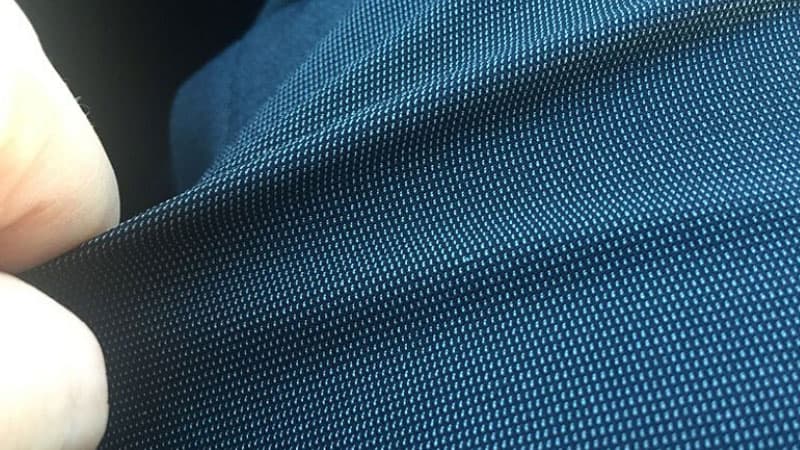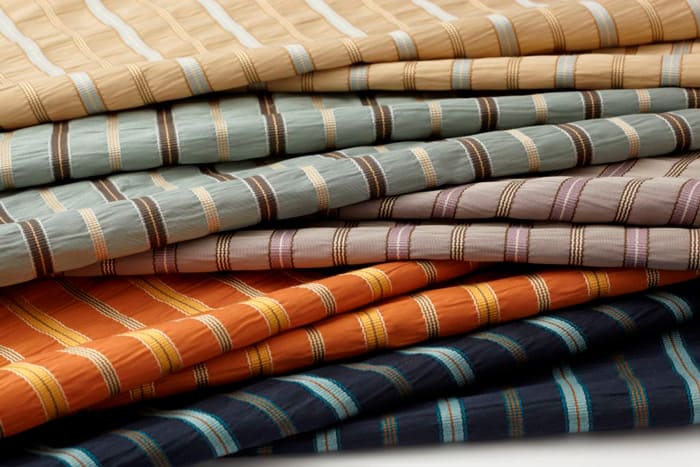What Are The Pros and Cons of Polyester Fabric?
by William Sanders
Polyester is one of the widely used fabrics by apparel manufacturers across the globe. Sportswear brands, in particular, have a soft spot for this fabric due to its suitability for making athletics wear.
Like all the other textile fabrics, however, polyester too has its good and ugly sides. Knowing the strengths and weaknesses of this fabric is helpful when buying a garment made of this fabric to help you decide if it's worth investing in or not.
In this guide, we'll take a closer look at the pros and cons of polyester fabric to help you better understand this fabric.
Contents
What Are The Pros and Cons of Polyester Fabric?

The pros of polyester fabric

- Durability: one of the top benefits of polyester fabric that it has a high strength, which translates to the ultimate durability. It can withstand regular wear and washes and shows excellent resistance to wear and abrasion. This is one of the reasons why sportswear is made of polyester as it can withstand daily, strong, repeated movements.
- Dry-wicking fabric: the fabric also boasts of low moisture regain (MR) properties, where it absorbs moisture excellent, but instead of retaining it, it evaporates quickly, leaving your garment dry. This is another reason why polyester is preferred for sportswear manufacturers.
- Polyester fabrics dry faster: given the fabric's lower absorbency properties, it dries faster than other popular fabrics like cotton. This means it'll spend less time in your dryer than other materials, consequently helping you save on your energy bills.
- Less prone to stains: the fact that this fabric is less absorbent also means it doesn't stain easily, unlike other fabrics out there.
- Incredibly lightweight: the lightweight nature of the polyester fabric makes it yet another reason why it's used for making activewear.
- Wrinkle and shrinking resistant: polyester has a relatively small shrink threshold and will always hold its shape and form no matter how many times you wash it. It also resists wrinkles and fades no matter how many times you wash it.
- Inexpensive: The competitive pricing between cotton and polyester allows for polyester pricing. And because this is synthetic/man-made fiber, it doesn't suffer a lot of market fluctuations compared to natural fibers like cotton. This translates to more consistent costs.
- Easy care: polyester made clothes are 100% machine washable and dryerable. They also don't require much ironing. And you can dry-clean them with no problems.
- Versatile: manufacturers can easily blend polyester with other fibers to help combine its benefits with those of other fibers and achieve even better end products. Some of the most popular polyester blends include cotton-polyester (50/50 or 65/35), polyester-cotton-rayon (50/25/25), and polyester-spandex blends (85/15).
- Recyclable fabric: above all, polyester is 100% recyclable at the end of its life. This helps save the environment since this material will not decompose when you throw it away and will only contribute to a landfill. However, keep in mind that this synthetic fiber degrades every time it gets recycled.

The cons of polyester fabric

- Less breathable: the fact polyester is a plastic-based fabric means it has limited breathability. This means it's not suitable for making things like beddings
- Moderately flammable material: polyester isn't highly flammable and doesn't always ignite. If it does, however, it tends to stick to your skin and leaves you with more severe burns than natural fibers.
- Non-environmental-friendly: polyester registers high resistance to bio-degradation, so throwing your old polyester garments away will contribute to landfills. If you're an environmental conscious earther, you'd want to think twice about buying polyester clothes.
- Temperature-sensitive: polyester made clothes are sensitive temperatures. If you're planning to print on t-shirts and other garments made of this material, therefore, you should take extra care to prevent melting and scorching experience.
- Lacks a soft texture: unlike cotton, which feels soft against your skin, polyester has a slightly rough texture and might not feel comfortable against your skin. This is especially true for people with sensitive skin.
Final Thoughts
So, these are the advantages and disadvantages associated with polyester.
Remember that polyester is 100% man-made, plastic-based fiber. It boasts of unmatched durability, ability to hold up to numerous wearing and washings, and resistance to wrinkles and shrinking. It's also easy to take care of and dries pretty fast.
Regarding the cost, it stands among the most affordable textile fibers available today.
However, it comes with a few downsides like being less breathable, sensitivity to temperature, and a slightly rough texture that can feel uncomfortable on people with sensitive skin.
 |
 |
 |
 |
 |
 |
 |
 |

About William Sanders
William Sanders was born and raised in California. After receiving his Master’s degree in information science from San Diego State University, he started working as a city councilor. In his spare time, William enjoys playing best-selling MMORPG games such as World of Warcraft and Fnal Fantasy, where he often takes on the role of guild leader with hundreds of players collaborating for success under his leadership. William is also a regular contributor to some popular magazines such as San Jose Mercury News, Gleanster Research, and Palmgear.
Leave a Reply
You can get FREE Gifts. Or latest Free phones here.
Disable Ad block to reveal all the info. Once done, hit a button below
 |
 |
 |
 |